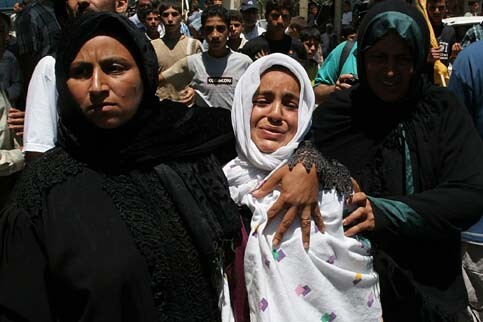South Africa 16 June 2006

A Palestinian girl, Huda Ghalia, weeps during the funeral of her family members killed yesterday in Israeli shelling of the northern Gaza Strip’s seafront, in the town of Beit Lahiya June 10, 2006. Palestinian officials said Israeli air strikes and artillery fire had killed 10 Palestinians, including three children and on a crowded Gaza beach, the highest Palestinian death toll in a single day since late 2004. (MaanImages/Wesam Saleh)
As we continue to see the Israeli PR machine spin its web, the Americans and major press outlets accept whole-heartedly the version of events that is spewed out by Israeli lap dogs.
My goodness, Israel - you certainly have learned your lesson well from the old apartheid South African government.
Today marks 30 years since that infamous day in the township of Soweto when hundreds of thousands of students protested Bantu Education. The police waited for the marchers near a dusty intersection and unleashed hell on innocent children. Official reports claimed that 700 children died over the course of the year that the student uprisings occurred; more than likely, these were conservative estimates.
Regardless of the numbers, a massacre occurred and the world barely took notice. Of course we can cut the world a little slack back then; they didn’t have the Internet, worldwide cable, or satellite dishes in many homes. However, many brave journalists managed to get the word out about what was happening, and some people in other parts of the globe began to make a fuss.
But the South African government was skilled at PR and knew what exactly to do. The name of the game was denial. Deny that children were protesting against an unjust educational system; deny that the police were firing into crowds of unarmed youth; deny that children as young as twelve were being detained under terrorism statues - all for having the audacity to say: no to Afrikaans, no to Bantu education, and no to apartheid.
I remember receiving a newspaper from a cousin of mine several weeks after the incident and reading how John Voster, then the prime minister, claimed that the police were under heavy fire from Black terrorists and had no choice but to shoot in the direction of the shots.
What was more outlandish was the fact that many South Africans - and the world for that matter - bought this without so much as raising a fuss.
As reports trickled in about the uprising escalating, many White South Africans were oblivious to what was transpiring not more than ten minutes’ drive from their cushy suburban households. And those who did read the news only received the official police version: “We are in a battle with Black terrorists and communists who want to take over this country.”
And with that, the party line would be accepted. The demands for answers, with the exception of a few brave journalists and activists, would cease, and the names and faces of those who perished who never be heard from again. Those faces included my 15-year-old cousin Musa (pronounced Moo-saah) and my 13-year-old cousin Nomhle (nome-shlay)
Last Friday, as I watched the footage of little Huda Ghalia screaming on the beach, I wondered to myself if this could be a time when the world would finally take notice of sort of carnage Israel was committing in the name of security.
I wasn’t surprised to see the Israeli spin machine go into high gear after first regretting the deaths of Huda’s family members, then reversing course saying that the explosive was a mine planted by Hamas.
Several journalists, and the head of the UN Kofi Annan, have expressed concerns over the account of events given by Israel, and a Pentagon damage expert, Marc Garlasco stated “all evidence points to a 155mm Israeli land-based artillery shell as its cause.” But CNN, CBS, ABC, NBC, and BBC all stuck to the official Israeli version of the story - putting the blame on Hamas.
And so the story goes.
I remember being at the Truth and Reconciliation Hearings in South Africa. I represented my family there because a policeman who had killed my brother in front of me when I was five was confessing his crimes during the apartheid era.
After the session, I arose to leave the room. An Afrikaans gentlemen stopped me. He had a huge smile on his tan leather-worn face. He leaned in close and said; “You know I never did trust what the bloody government told me back in ‘76 of what was happening in the townships.”
I looked on at him, trying to contain my rage. I wanted to grab him, shake him and say; “Sure, it’s easy to say that now, Mister. Things have changed in such a dramatic way in the country. The crimes committed against my family and many others are far too much to ignore!”
But I didn’t say it. I held my tongue and thanked him, as he turned and walked away.
As I sat watching Huda screaming at the loss of her dead father, I think to myself; “I wonder if some Israeli will walk up to her one day and make a similar comment as the Afrikaans gentleman did to me?”
I wonder how she would react?
Christopher Brown is a radical grassroots journalist based in Arizona. He will be returning to Palestine to continue working with his Palestinian and Israeli partners for a just solution to this conflict in 2007.
Related Links





